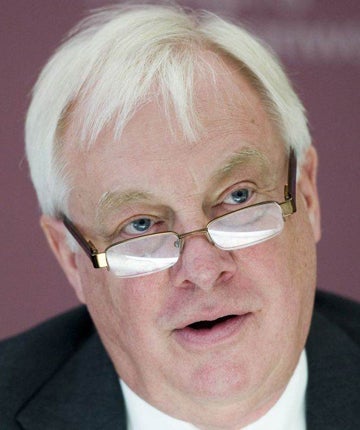Patten: I won't be popular at the BBC

Your support helps us to tell the story
From reproductive rights to climate change to Big Tech, The Independent is on the ground when the story is developing. Whether it's investigating the financials of Elon Musk's pro-Trump PAC or producing our latest documentary, 'The A Word', which shines a light on the American women fighting for reproductive rights, we know how important it is to parse out the facts from the messaging.
At such a critical moment in US history, we need reporters on the ground. Your donation allows us to keep sending journalists to speak to both sides of the story.
The Independent is trusted by Americans across the entire political spectrum. And unlike many other quality news outlets, we choose not to lock Americans out of our reporting and analysis with paywalls. We believe quality journalism should be available to everyone, paid for by those who can afford it.
Your support makes all the difference.Lord Patten told MPs yesterday that if he was confirmed as the new chairman of the BBC he would expect to be unpopular – and predicted that "there will be all hell let loose" as the corporation is forced to cut spending on programming.
"There are going to be huge fusses about it, there will be petitions, there will be blogs, there will be websites and there will be all hell let loose," he said as he was scrutinised by the Culture, Media and Sport Committee over his government-proposed appointment as the chairman of the BBC Trust. "I don't think it's going to be a particularly popular job in the next few years."
The former Conservative cabinet minister refused demands from Labour to give up membership of his party and insisted he would also retain other controversial roles, including membership of BP's advisory board and a position as a business ambassador for the Prime Minister.
He was asked by the Labour MP Tom Watson whether there was a conflict of interest in his being chairman of a broadcaster that might be covering events such as the Gulf of Mexico oil spill or the Libyan uprising. "A conflict of interest would be if you were... using your position at the BBC Trust in some unreasonable way," he replied.
The former Conservative Party chairman will retain his role as Chancellor of Oxford University. He also wishes to remain on the trust body for the Catholic newspaper The Tablet. But he has decided to step down from his positions with the International Crisis Group and Medical Aid for Palestine. "I recognised that that would be regarded by some as conflicting and too controversial," he said.
Lord Patten, the former Governor of Hong Kong, told the committee that the BBC was the greatest public service broadcaster in the world. "I don't feel any shame at all in asserting what we now call Reithian principles at the BBC," he said. "It's really important that it should stand for the most civilised aspects of being British."
Asked by Therese Coffey MP what the most important values of the BBC were, he said: "I think the BBC should be biased. It should be biased in favour of tolerant, civilised pluralism. I think it should continue to reflect the cultural identity and diversity of this country."
He rejected the suggestion that the corporation had an inbuilt bias and went out of his way to praise the BBC's Middle East editor Jeremy Bowen and its political editor Nick Robinson. Of the supposed urban liberal leanings of the BBC, Lord Patten reflected that in 1966 he had chosen a first job in the Conservative research department in preference to the offer of a graduate traineeship at the BBC. Had he followed the other path he might not now be considered an old-fashioned Tory but a "metrosexual leftie", he observed, to laughs from the gallery.
Suave and witty, he remained unruffled during what had been billed as a grilling. He said BBC executives couldn't expect to receive the remuneration they might expect at "Barclays bank", and that ageism at the corporation was unacceptable, particularly as it might rule him out of a job.
His weakest moments came when he was challenged on his knowledge of BBC programmes. Had he listened to 6 Music? "No." Radio 1? "When trying to get to [Radio] 3 or 4." That got another laugh, but Labour MP David Cairns was unimpressed. "I'm not getting the passion," he complained. "The only passion you've demonstrated is a passion for Melvyn Bragg."
Join our commenting forum
Join thought-provoking conversations, follow other Independent readers and see their replies
Comments